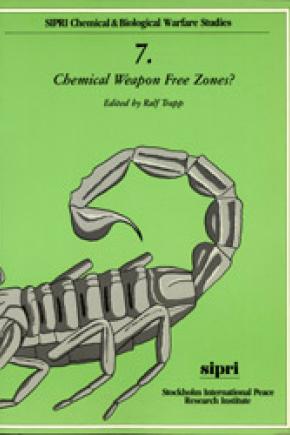Chemical Weapon Free Zones?
This study presents 11 essays by experts on the implications of the chemical-weapon-free zone (CWFZ) concept for European security, its implications for the Geneva endeavours to ban chemical warfare world-wide, and compliance assurance. Strongly contrasting evaluations are presented together with background information with the intent of putting the future debate onto a firmer foundation. A chronology of events, extensive bibliographies and an annex of relevant documents are included.
Contents
Part I. Introduction
An historical context for European chemical-free-zone concepts, with an account of current European chemical-warfare forces (Julian P. Perry Robinson)
A European zone free of chemical weapons: A regional precursor for the world-wide ban on chemical weapons (Ralf Trapp)
A chronology of events (Kristina Mårtensson)
Part II. European security and chemical-weapon-free zone concept
A chemical-weapon-free zone in Europe: Pilot project for a second phase of détente (Karsten D. Voigt)
A chemical-free zone in Central Europe: Significance, conditions and implications (Pierre-Henri Renard)
Towards a chemical-weapon-free zone in Central Europe (Jirí Matoušek)
Part III. The regional approach and the prospects for a world-wide ban on chemical weapons
Pros and cons of a chemical-weapon-free zone in Europe (Karlheinz Lohs)
The relationship between the proposal for a chemical-weapon-free zone in Europe and the negotiations at the Conference on Disarmament in Geneva on a world-wide ban (Charles Flowerree)
Part IV. Compliance and compliance assurance for the regional step
Verifying a Trojan horse: A chemical-weapon-free zone (Manfred Hamm)
Creating a zone free of chemical weapons: An essential step towards arms limitation and disarmament (Ralf Stöhr)
Annex
About the editor
Ralf Trapp is a chemist by training. He is a researcher in the field of chemical toxicology with the GDR Academy of Sciences, Institute of Chemical Toxicology, Leipzig. He has published on chemical weapons disarmament for several years, and served as a governmental consultant on this matter. Currently he is a member of the SIPRI research staff.
About the series editor
Julian Perry Robinson, the Series Editor, is a SIPRI Consultant based in England. A chemist and lawyer by training, he was a member of the SIPRI research staff during 1968-71 and has held research appointments at the Harvard University Center for International Affairs, the Free University of Berlin, and the University of Sussex, UK, where he is currently a Senior Fellow of the Science Policy Research Unit. He has served as a consultant to the World Health Organization, the United Nations Secretariat, the International Committee of the Red Cross and the UN Environment Programme.
SIPRI Chemical & Biological Warfare Studies is a series of studies intended primarily for specialists in the field of CBW arms control and for people engaged in other areas of international relations or security affairs whose work could benefit from a deeper understanding of particular CBW matters. The papers originate in studies commissioned by SIPRI as input for subsequent non-specialist SIPRI publications.

